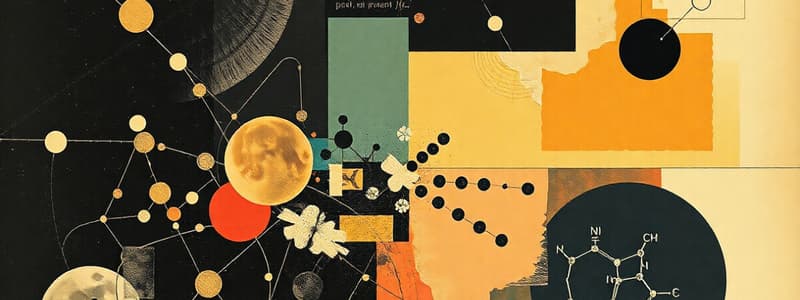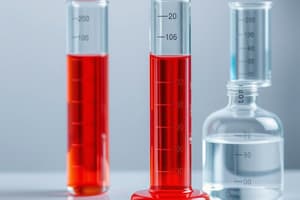Podcast
Questions and Answers
Which of the following is always favorable for solution formation?
Which of the following is always favorable for solution formation?
- Endothermic enthalpy change and increasing entropy (correct)
- Exothermic enthalpy change and decreasing entropy
- No enthalpy or entropy change
- Exothermic enthalpy change and increasing entropy (correct)
- Endothermic enthalpy change and decreasing entropy
Which process in solution formation is always exothermic?
Which process in solution formation is always exothermic?
- Breaking solute-solute interactions
- Breaking solvent-solvent interactions
- Increasing temperature
- Increasing entropy
- Forming solute-solvent interactions (correct)
If a solution formation process has a positive enthalpy change, under what condition can it still occur?
If a solution formation process has a positive enthalpy change, under what condition can it still occur?
- If the entropy change is large and positive (correct)
- If the solute is nonpolar
- If the temperature is lowered
- If solvent-solvent interactions are weak
- If the entropy change is negative
What is the primary factor determining whether a solute will dissolve in a solvent?
What is the primary factor determining whether a solute will dissolve in a solvent?
According to the 'like dissolves like' principle, which solvent would best dissolve NaCl?
According to the 'like dissolves like' principle, which solvent would best dissolve NaCl?
What type of intermolecular force is dominant in nonpolar substances?
What type of intermolecular force is dominant in nonpolar substances?
Why does oil not dissolve in water?
Why does oil not dissolve in water?
What is the role of dynamic equilibrium in the solution process?
What is the role of dynamic equilibrium in the solution process?
Which of the following represents the equilibrium expression for an ionic solid dissolving in water?
Which of the following represents the equilibrium expression for an ionic solid dissolving in water?
What does a high Ksp value indicate?
What does a high Ksp value indicate?
How does pressure affect the solubility of gases in liquids?
How does pressure affect the solubility of gases in liquids?
Why does increasing temperature usually increase the solubility of solids?
Why does increasing temperature usually increase the solubility of solids?
What is the main reason gases are less soluble at higher temperatures?
What is the main reason gases are less soluble at higher temperatures?
Which factor does NOT affect solubility?
Which factor does NOT affect solubility?
What effect does the common ion effect have on solubility?
What effect does the common ion effect have on solubility?
What happens when a solution becomes supersaturated?
What happens when a solution becomes supersaturated?
How does entropy affect solubility?
How does entropy affect solubility?
Why does salt dissolve in water but not in oil?
Why does salt dissolve in water but not in oil?
What is the effect of adding a common ion to a saturated solution?
What is the effect of adding a common ion to a saturated solution?
What is the primary reason ionic compounds dissolve in water?
What is the primary reason ionic compounds dissolve in water?
What happens to a solution when the temperature is lowered?
What happens to a solution when the temperature is lowered?
Which of the following colligative properties affects freezing point?
Which of the following colligative properties affects freezing point?
How does increasing solute concentration affect the boiling point of a solution?
How does increasing solute concentration affect the boiling point of a solution?
What factor influences osmotic pressure?
What factor influences osmotic pressure?
What is the effect of increasing the number of solute particles on freezing point?
What is the effect of increasing the number of solute particles on freezing point?
Which of the following statements best describes Raoult's Law?
Which of the following statements best describes Raoult's Law?
How does an increase in temperature affect vapor pressure?
How does an increase in temperature affect vapor pressure?
What type of solution contains the maximum amount of dissolved solute at equilibrium?
What type of solution contains the maximum amount of dissolved solute at equilibrium?
What is the key characteristic of a supersaturated solution?
What is the key characteristic of a supersaturated solution?
Which of the following solutions has the highest boiling point?
Which of the following solutions has the highest boiling point?
How does the addition of a non-volatile solute affect the vapor pressure of a solvent?
How does the addition of a non-volatile solute affect the vapor pressure of a solvent?
What happens when two solutions of different concentrations are separated by a semipermeable membrane?
What happens when two solutions of different concentrations are separated by a semipermeable membrane?
What is the primary factor affecting colligative properties?
What is the primary factor affecting colligative properties?
Which of the following has the greatest effect on colligative properties?
Which of the following has the greatest effect on colligative properties?
Why does salt lower the freezing point of water?
Why does salt lower the freezing point of water?
Which statement best describes Henry's Law?
Which statement best describes Henry's Law?
What is the primary driving force for osmosis?
What is the primary driving force for osmosis?
What effect does increasing atmospheric pressure have on the solubility of gases in liquids?
What effect does increasing atmospheric pressure have on the solubility of gases in liquids?
Why does carbon dioxide escape from soda when opened?
Why does carbon dioxide escape from soda when opened?
What is the effect of pressure on the boiling point of a liquid?
What is the effect of pressure on the boiling point of a liquid?
Which of the following affects the solubility of ionic compounds in solution?
Which of the following affects the solubility of ionic compounds in solution?
What is the primary cause of vapor pressure lowering in solutions?
What is the primary cause of vapor pressure lowering in solutions?
What happens when a non-volatile solute is added to a solvent?
What happens when a non-volatile solute is added to a solvent?
What determines the magnitude of colligative property changes?
What determines the magnitude of colligative property changes?
What is the relationship between boiling point elevation and the number of dissolved solute particles?
What is the relationship between boiling point elevation and the number of dissolved solute particles?
What is the effect of increasing solute concentration on osmotic pressure?
What is the effect of increasing solute concentration on osmotic pressure?
How does molecular polarity affect solubility?
How does molecular polarity affect solubility?
What happens when a solution is at equilibrium?
What happens when a solution is at equilibrium?
How does increasing solute concentration affect freezing point depression?
How does increasing solute concentration affect freezing point depression?
Which of the following best describes a colligative property?
Which of the following best describes a colligative property?
Flashcards
Favorable solution formation
Favorable solution formation
A favorable process in solution formation involves a release of heat (exothermic) and an increase in disorder (increasing entropy).
Exothermic process in solution formation
Exothermic process in solution formation
The formation of attractions between solute and solvent molecules is always a process that releases energy.
Endothermic solution formation
Endothermic solution formation
A solution can still form even with energy input (endothermic) if there is a significant increase in disorder (large positive entropy change).
Solubility: 'like dissolves like' principle
Solubility: 'like dissolves like' principle
Signup and view all the flashcards
NaCl dissolves in water
NaCl dissolves in water
Signup and view all the flashcards
Nonpolar substances: LDF
Nonpolar substances: LDF
Signup and view all the flashcards
Oil and water don't mix
Oil and water don't mix
Signup and view all the flashcards
Dynamic equilibrium in solution
Dynamic equilibrium in solution
Signup and view all the flashcards
Solubility product constant (Ksp)
Solubility product constant (Ksp)
Signup and view all the flashcards
High Ksp value
High Ksp value
Signup and view all the flashcards
Pressure & gas solubility
Pressure & gas solubility
Signup and view all the flashcards
Temperature & solid solubility
Temperature & solid solubility
Signup and view all the flashcards
Temperature & gas solubility
Temperature & gas solubility
Signup and view all the flashcards
Catalyst & solubility
Catalyst & solubility
Signup and view all the flashcards
Common ion effect
Common ion effect
Signup and view all the flashcards
Supersaturated solution
Supersaturated solution
Signup and view all the flashcards
Entropy & solubility
Entropy & solubility
Signup and view all the flashcards
Salt and oil: Different polarities
Salt and oil: Different polarities
Signup and view all the flashcards
Adding a common ion to a saturated solution
Adding a common ion to a saturated solution
Signup and view all the flashcards
Ionic compounds dissolve in water
Ionic compounds dissolve in water
Signup and view all the flashcards
Lowering temperature & gas solubility
Lowering temperature & gas solubility
Signup and view all the flashcards
Freezing point depression
Freezing point depression
Signup and view all the flashcards
Boiling point elevation
Boiling point elevation
Signup and view all the flashcards
Osmotic pressure
Osmotic pressure
Signup and view all the flashcards
Solute particles & freezing point
Solute particles & freezing point
Signup and view all the flashcards
Raoult's Law
Raoult's Law
Signup and view all the flashcards
Temperature & vapor pressure
Temperature & vapor pressure
Signup and view all the flashcards
Saturated solution
Saturated solution
Signup and view all the flashcards
Supersaturated solution
Supersaturated solution
Signup and view all the flashcards
Colligative property
Colligative property
Signup and view all the flashcards
Study Notes
Solution Formation
- Favorable factors: Exothermic enthalpy change and increasing entropy are always favorable for solution formation.
Solution Formation Processes
- Exothermic process: Forming solute-solvent interactions is always exothermic.
Conditions for Solution Formation
- Positive enthalpy change: A solution formation process with a positive enthalpy change can still occur if the entropy change is large and positive.
Factors Affecting Solubility
- Primary factor: Intermolecular forces are the primary determinant of whether a solute will dissolve in a solvent.
"Like Dissolves Like" Principle
- Solvent choice: NaCl (ionic) dissolves best in water (polar).
Intermolecular Forces in Nonpolar Substances
- Dominant force: London Dispersion forces are dominant in nonpolar substances.
Oil and Water Miscibility
- Immiscibility reason: Oil molecules are nonpolar, while water is polar, and "like dissolves like".
Dynamic Equilibrium in Solutions
- Role in solution process: It maintains a balance between dissolution and crystallization ensuring constant solubility.
Ionic Solid Solubility Equilibrium
- Equilibrium expression:
Ksp = [cation]^m [anion]^ndescribes the equilibrium for an ionic solid dissolving in water.
High Ksp Value
- Solubility indication: A high
Kspvalue indicates a high solubility of the solute.
Pressure Effects on Gas Solubility
- Solubility effect: Increasing pressure increases gas solubility in liquids.
Temperature Effects on Solid Solubility
- Solubility effect: Increasing temperature usually increases the solubility of solids.
Temperature Effects on Gas Solubility
- Solubility effect: Increasing temperature decreases the solubility of gases in liquids.
Factors Affecting Solubility (Not Affecting Solubility)
- Factors NOT affecting solubility: Nature of the solvent, presence of catalyst, does not affect solubility.
Common Ion Effect on Solubility
- Solubility effect: Decreases solubility.
Supersaturated Solutions
- Characteristic: Contains dissolved solute beyond equilibrium concentration; excess solute precipitates out if the system is disturbed.
Colligative Properties and Freezing Point
- Effect: Increasing solute concentration decreases freezing point.
Colligative Properties and Boiling Point
- Effect: Increasing solute concentration increases boiling point.
Ionic Compound Solubility and Solution
- Factors: Common ion effect, lattice energy, solvent polarity, and temperature can all affect solubility.
Vapor Pressure Lowering
- Cause: Addition of a non-volatile solute lowers vapor pressure.
Osmosis and Solute Concentration
- Driving force: Solute concentration gradient drives osmosis.
Colligative Properties and Solute Particles
- Relationship: Colligative properties depend on the number of solute particles, not their identity.
Raoult's Law
- Description: The vapor pressure of a solution is proportional to the mole fraction of solvent.
Studying That Suits You
Use AI to generate personalized quizzes and flashcards to suit your learning preferences.




